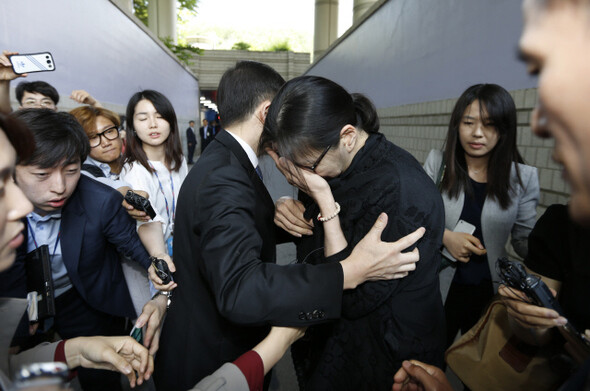hankyoreh
Links to other country sites 다른 나라 사이트 링크
Supreme Court acquits former Korean Air vice president in “nut rage” case

The Supreme Court has delivered an acquittal in the “nut rage” case involving former Korean Air vice president Cho Hyun-ah. In an en banc ruling on Dec. 21 under Chief Justice Hon. Kim Myeong-su, the Supreme Court found Cho, 43, not guilty of violating the Aviation Security Act by altering the course of an aircraft. With its ruling, the court upheld an original decision sentencing Cho to ten months in prison suspended for two years on charges of criminal interference with operations.
In its ruling, the Supreme Court accepted the appellate court’s conclusion that movement of a passenger aircraft on the ground does not constitute “altering a flight course” according to the Aviation Security Act.
“The dictionary definition of a ‘flight course’ is the course traveled by an aircraft [in the air],” the Supreme Court said.
“Nowhere in the international agreements that serve as a basis for the Aviation Security Act has movement of an aircraft on the ground been named as corresponding to this offense,” it added.
“Even if the meaning of ‘in operation’ according to the Aviation Security Act is extended to the moment the aircraft doors close, the interpretation of ‘flight course’ should not stray from the original sense and must be interpreted strictly according to the principle of nulla poena sine lege.”
The court also said there was “no blind spot in terms of punishing the act of disrupting the course of an aircraft on the ground, as it can be punished as interference with the captain’s performance of duties.”
In a minority opinion, Justices Hon. Park Poe-young, Hon. Jo Hee-de, and Hon. Park Sang-ok argued, “Because the meaning of ‘in operation’ has been extended to an aircraft on the ground, it does not violate the principle of nulla poena sina lege to broadly interpret ‘course’ to mean the path traveled by an ‘operating aircraft,’ be in on the ground or in the air.”
“As there is also the risk of a major accident occurring while an aircraft is moving on the ground, threats to safe operation must be sternly punished,” the justices said in calling for the original ruling to be overturned and returned.
Cho was arrested and indicted in Jan. 2015 on charges of interfering with the operation of an aircraft when she assaulted a crew member and had a Korean Air passenger plane turn around as it prepared to depart from John F. Kennedy Airport in New York.
The first trial court sentenced Cho to one year in prison, arguing that the word “flight course” included “movement on the ground before takeoff and after landing.” But the appellate court acquitted Cho of altering the course of an aircraft, claiming it was “excessively broad to interpret movement on the ground as the ‘flight course.’”
By Yeo Hyeon-ho, senior staff writer
Please direct questions or comments to [english@hani.co.kr]

Editorial・opinion
![[Editorial] Perilous stakes of Trump’s rhetoric around US troop pullout from Korea [Editorial] Perilous stakes of Trump’s rhetoric around US troop pullout from Korea](https://flexible.img.hani.co.kr/flexible/normal/500/300/imgdb/original/2024/0509/221715238827911.jpg) [Editorial] Perilous stakes of Trump’s rhetoric around US troop pullout from Korea
[Editorial] Perilous stakes of Trump’s rhetoric around US troop pullout from Korea![[Guest essay] Preventing Korean Peninsula from becoming front line of new cold war [Guest essay] Preventing Korean Peninsula from becoming front line of new cold war](https://flexible.img.hani.co.kr/flexible/normal/500/300/imgdb/original/2024/0507/7217150679227807.jpg) [Guest essay] Preventing Korean Peninsula from becoming front line of new cold war
[Guest essay] Preventing Korean Peninsula from becoming front line of new cold war- [Column] The state is back — but is it in business?
- [Column] Life on our Trisolaris
- [Editorial] Penalties for airing allegations against Korea’s first lady endanger free press
- [Editorial] Yoon must halt procurement of SM-3 interceptor missiles
- [Guest essay] Maybe Korea’s rapid population decline is an opportunity, not a crisis
- [Column] Can Yoon steer diplomacy with Russia, China back on track?
- [Column] Season 2 of special prosecutor probe may be coming to Korea soon
- [Column] Park Geun-hye déjà vu in Yoon Suk-yeol
Most viewed articles
- 1Nuclear South Korea? The hidden implication of hints at US troop withdrawal
- 2[Editorial] Perilous stakes of Trump’s rhetoric around US troop pullout from Korea
- 3[Photo] ‘End the genocide in Gaza’: Students in Korea join global anti-war protest wave
- 4Behind-the-times gender change regulations leave trans Koreans in the lurch
- 5‘Free Palestine!’: Anti-war protest wave comes to Korean campuses
- 6Korean president’s jailed mother-in-law approved for parole
- 7Dermatology, plastic surgery drove record medical tourism to Korea in 2023
- 8[Guest essay] Preventing Korean Peninsula from becoming front line of new cold war
- 9In Yoon’s Korea, a government ‘of, by and for prosecutors,’ says civic group
- 10Real-life heroes of “A Taxi Driver” pass away without having reunited